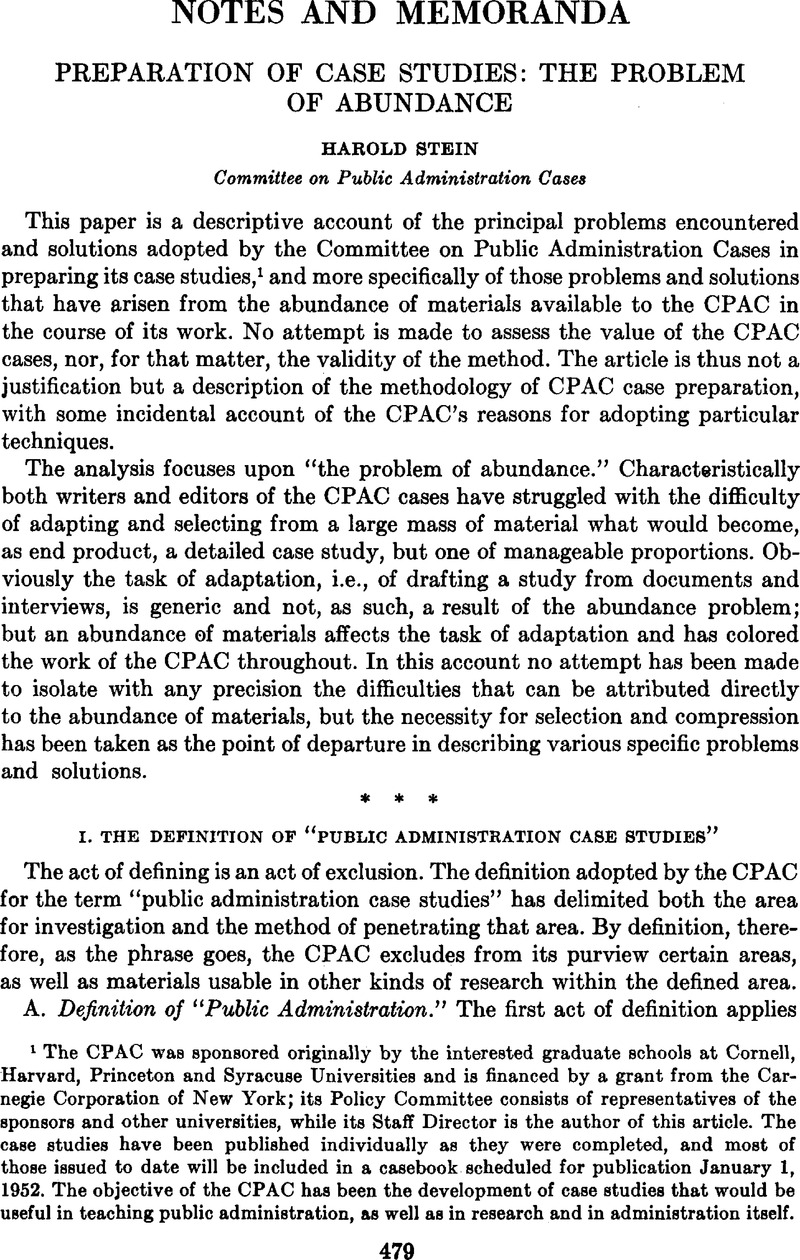Article contents
Preparation of Case Studies: The Problem of Abundance
Published online by Cambridge University Press: 02 September 2013
Abstract

- Type
- Notes and Memoranda
- Information
- Copyright
- Copyright © American Political Science Association 1951
References
1 The CPAC was sponsored originally by the interested graduate schools at Cornell, Harvard, Princeton and Syracuse Universities and is financed by a grant from the Carnegie Corporation of New York; its Policy Committee consists of representatives of the sponsors and other universities, while its Staff Director is the author of this article. The case studies have been published individually as they were completed, and most of those issued to date will be included in a casebook scheduled for publication January 1, 1952. The objective of the CPAC has been the development of case studies that would be useful in teaching public administration, as well as in research and in administration itself.
2 For those unfamiliar with the CPAC cases, it may be useful to note that the concept of a “detailed” case study of a fairly significant and complex issue has resulted in cases running, for the most part, from 75 to 150 pages. The cases contain far more detail than the Case Reports of the SSRC Committee on Public Administration, but generally rather less detail than the Harvard Business School cases, such as those included in Glover, John D. and Hower's, Ralph M.The Administrator (Chicago, 1949)Google Scholar, though the Business School cases dealing with rather narrow issues are generally shorter than the CPAC cases.
3 This exclusion was negative on the part of the CPAC in that the subjects sought by the CPAC were of another type. Perhaps any need of teachers of public administration for case materials of this character can be reasonably satisfied by the business cases, since there is some reason to believe that the special characteristics of public administration are of far less consequence in activity of this sort than in situations involving larger, more conscious and more formal decisions.
4 The heavy concentration on high-level interagency conflict cases (if a parenthetical evaluative interjection may be permitted) has been a source of some dissatisfaction to the CPAC. The concentration will be diluted in the forthcoming CPAC casebook by the inclusion of a number of cases of rather different character prepared at Harvard University in 1945–46 under the supervision of Dr. Pendleton Herring.
5 A scrupulous effort has been made to avoid in any instance more positive statement than the evidence justifies in the eyes of author and editors, but no effort has been made to have the text reflect the innumerable variations in the degree of documentation behind each statement. The rationale for omitting footnotes and other types of scholarly apparatus from the case studies lies outside the scope of this paper.
6 In his preface to The Wings of the Dove, James has expounded his rigorous insistence on seeing, if not the whole book, then each part of it through the eyes of a single person— “no sacrifice of the recording consistency”; but his exposition of what is involved in this rigorous consistency is sufficient to show that the technique in its pure form is unattainable by the historical analyst.
- 1
- Cited by





Comments
No Comments have been published for this article.